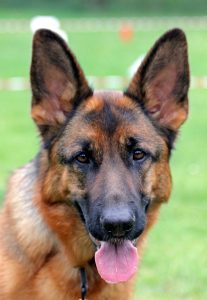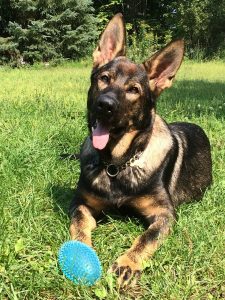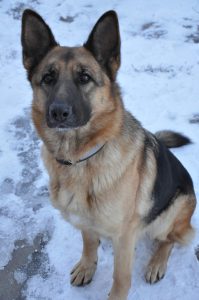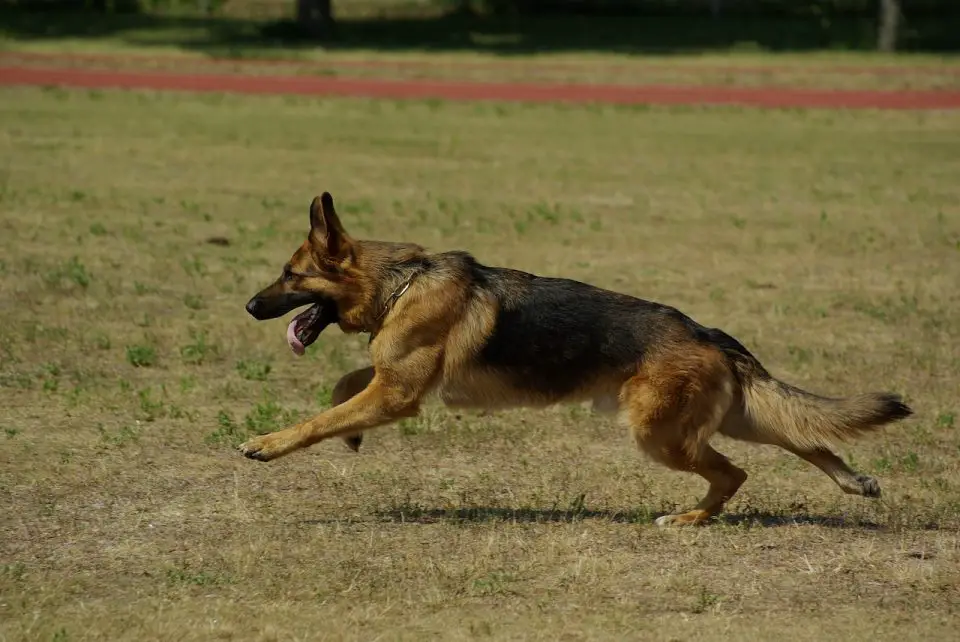German Shepherds are magnificent dogs. They hold themselves with such confidence, loyalty and their impressive ‘don’t mess with me’ size gives them a sense of awe.
Their black and brown coat, and gentle curves throughout their body make them an attractive breed.
These proud dogs make devoted companions, but like all breeds there are some amazing qualities but also a few considerations which we will also talk about here.
We don’t expect choosing a dog breed to be simple, so here we have highlighted some of the German Shepherd pros and cons, to give a helping hand.
Little About the German Shepherds
German Shepherd or Alsatian as they are also referred to as, are good old fashioned working dogs. In particular a German herding dog.
It wasn’t until the late 19th century than Captain Max von Stephanitz and friends crossed variations of the old style German shepherd to create the ancestors of the breed we know and love today.
It wasn’t all plain sailing for this breed, and its popularity took a hit during the world wars due to its origin in Germany and through fewer and fewer farms requiring canine assistance.
Fortunately, von Stephanitz was an adaptable msn and forward thinker. He promoted the breed not only as a herder, but also as a good all round working dog.
Today, this breed is the dog of choice for the police and military services, a long way from the Germany’s pastures!
Here, we consider the many benefits of having a dog bred to be the perfect partner but also how some of those traits that make them so respected in there line of work may not work for the modern day family.
Now we’ve covered a little bit about the breed, let’s dive into some of the pros and cons of German Shepherds!
German Shepherd Pros
Firstly, let’s start our German Shepherd pro and con list with the pros, since there are many reasons to love German Shepherds!
 1) They are excellent in show
1) They are excellent in show
Agility, herding, tracking and dock diving are just a few games this dog can play and win!
Even if you don’t want to be involved in major competitions, there are many local competitions that are just a bit of fun for both you and your dog.
2) They are healthy dogs
All breeds have a few predisposed conditions but these are relatively few in number. We discuss these below, in the cons section.
Of course, dogs are dogs and there is no way to predict how lucky your fluffy friend may be.
It is essential that you ensure that you can afford even the pricier of vet bills or have good insurance.
Fingers crossed, the only vet trips you will make are for vaccines and general checkups!
3) They are very intelligent
The bronze medal is nothing to laugh at in the rankings for the most intelligent dog breed.
These dogs are bred to learn quickly, to work with their senses to solve problems and ensure they respond reliably to their owner at all times.
This is a huge responsibility and this breed is smart enough to know it.
4) They are easy to train
Intelligence can be measured in trainability. As a top tier breed, this breed demonstrates that they can learn a new command in under five repetitions and follow the first command a nearly perfect 95 % of the time.
They are also bred literally to make their owners happy so are usually willing to obey any command.
5) They are a great intruder deterrent
This is one of the best guard dog breeds. They are entirely devoted to their owner and will do anything to keep them safe.
This is partnered with their natural possessive streak means that your family and house will be kept safe to the best of their ability.
The bark itself, deep and vicious is enough to terrify any intruder and remember that in the police they are actually trained to display aggression on command.
6) They make great search and rescue dogs
In the police they are trained to find people, weapons and clothing amongst others. They help save lives.
This could simply be a fun game around the house you could play or you could consider volunteering for your local search and rescue team in the area.
This does take a lot of training but would be very rewarding for you and your dog.
7) They won’t fail you in bad weather
A bit of rain never hurts is the mentality of any German shepherd.
Plenty of playtime, walks, swims is a no brainer to this breed. They will happily be out in all weathers.
8) They are easy to groom
 Baths are only needs when they are mucky. Nice and simply maybe once a month or so.
Baths are only needs when they are mucky. Nice and simply maybe once a month or so.
The German shepherds coat has natural oils which help keep its coat water resistant and clean so stripping these will cause more damage than good. T
hey hair will self regulate and only occasional brushing, about twice a week is needed to keep a healthy coat and hair off the furniture.
Brushing may need to be upped during shedding season; autumn and spring to keep a tidy dog and tidy house.
9) They are water babies
Always wanted a companion for that wild lake swim or a trip on the paddleboard on the beach? Then this may be perfect for you.
They simply love exercise and getting wet does not phase them. Just remember to let them shake before putting your dry kit on!
10) They are perfect for single owners
Devoted, protective and loyal, these dogs can make a person living alone (through choice or not) feel special.
They will not be won over to new people by a few treats and a fuss. A German shepherd has a tendency to single out one person to be devoted to. He does not share the love as well as other dogs.
Just to be Aware: German Shepherd Cons
Since we’ve covered a lot of the pros of German Shepherds, that leads onto the cons. We can’t look at the pros and cons of German Shepherds without them!
1) They shed a lot
These are big dogs, with a double coat which means a lot of hair.
There hairs may be medium in length but they will get everywhere and being dark in particular will show up…everywhere. Even in places you German Shepherd has never even been!
During the during the dreaded shedding season brushing will likely become a daily chore and if they are anything like my dog; don’t expect a hovered floor to look clean for more than ten minutes.
2) They are athletes
Lots of exercise for both their physical and mental well-being needs. This equates to about two hours a day.
A mixture of walks and high intensity play in a safe area such as a fenced garden is just a minimum requirement.
This is a huge time commitment to your dog and you must be able to commit to it every single day.
3) Puppy socialisation is a must
This breed can become nervous around other dogs and people.
They are also protective so they must learn that when Bob from over the road is walking Ted that they not a threat to you.
4) Needs continuous prompting of his training
These dogs should learn any command really quickly but they can need reminding sometimes, especially if they are distracted so keep practicing tricks every now and again.
Your dog will be more well-mannered and kept entertained so a win-win especially if a treat is thrown into the mix.
The American Kennel Club also recommends keeping this breed on a leash on walks as they have a tendency to run off if they find something they want to heard!
5) They are big dogs
 German shepherds stand 26 inches tall and weigh up to 90 pounds.
German shepherds stand 26 inches tall and weigh up to 90 pounds.
They are large even as a puppy, and will reach their full height at around 18 months of age, though it will take two years to reach their adult weight.
Like all puppies, during training expect them to jump up and pull on a leash. They will learn quickly but you must be strong enough to brace all there 90 pounds of muscle.
Maybe don’t invite your grandparents over during the initial training phase to ensure there are no accidents!
6) These dogs are simply not fit for a flat
These dogs will take up a lot of room and need a large garden to roam in in-between play sessions and walkies but also their tendency to bark will make enemies of the neighbours in such enclosed spaces.
Check out this article on German shepherd dog houses.
7) Healthy but still a few prone health conditions
Degeneration of the spinal cord, hip and elbow dysplasia are something to make sure breeders have tested for and any family history of the conditions.
This breed can also experience bloat (or gastric dilatation volvulus if you like the medical term).
Not like humans, this can be sudden and life- threatening because in this breed it can cause the stomach to rotate, preventing the movement of food and water through the gastric system.
Germans shepherd dogs may be prone due to their large chests but it is worth knowing signs for any breed just in case.
Symptoms of bloat include non-productive dry retching, distended stomach and abdominal discomfort. If you suspect this to be the case, seek veterinary attention immediately.
8) They bark, bark, bark
These dogs are noisy. They just love to tell you all about it. This can come in the form of quieter wines just for any reason but when a German shepherd barks it is very loud.
On walks with my own dog, we pass a house where a German Shepherd lives. When his owner is home he is as good as gold.
Not a peep as we pass. A triumph of obedience, however, when the owner is out it’s a different story.
I am sure this dog is just trying to protect his owner’s house… from everyone walking by (even on the opposite side of the road!) but the dog barks.
A proper loud, deep bark, but mind your neighbours as these dogs may be different when you are out and that is very hard to train out of a dog.
9) They may not be trusting
These dogs will love you to bits. Nothing will be better than you and as far as you know your shepherd is the most loving and friendly dog on the planet.
Your friends, neighbours and general acquaintances may not agree. This is because the complete devotion and loyalty they given their owner makes them suspicious of other people.
They just love you so much that there is just not enough to go round! If you have a lot of new guests, then this may not be the dog for you as they simply don’t warm up to new people.
They will get used to the frequent flyers such as your best friends but otherwise don’t expect your shepherd to go wagging its tail to all your guests.
10) They are not family dogs

A German shepherd throughout history had an owner. A style still adopted by the police and military. He will not be aggressive towards other family members but may just ignore them.
The sole responsibility of affection may end up resting on one particular member of the household, likely the person who is at home most and thus most responsible to food, walks etc.
German shepherds are a lot of work so this can put a lot of pressure on one member of the family as you might not be able to spread the responsibilities as easily as with other dogs.
This could also mean family members feel left out.
11) They get lonely
These dogs are bred to live and work with their owners which means they cannot comprehend why you would ever want to go out without them.
German shepherds won’t necessary amuse themselves in a way you approve while you are gone. These dogs can start to become more disruptive to punish you for leaving them (what did I say, they are smart dogs!).
Barking and chewing are among the common ones so if you and your family members work full time then this may not be a breed for you.
Alternatively, you can get dog sitters to keep dogs company but German shepherds’ are very loyal to their family and new members may not be welcomed with as much grace.
This approach even if they are friends can also get very expensive.
12) They have an excellent work ethic
This if you have a job for your shepherd is a good thing, however, most families now do not necessarily need a working dog.
Unless you work on a farm, in the police or a search and rescue team you will need to find a job for your shepherd or expect way too energy released in the most unconstructive ways.
Digging, barking, chewing are not uncommon in a bored German shepherd.
13) They aren’t good with other pets
They are not that sociable. In a good situation, they may simple ignore other pets but they can become aggressive and agitated with them, maybe even a little aggressive.
Even if they are on good form with your multi-species family, an energetic shepherd may be a bit too bouncy and cause upset with the other pets due to their big size and unlimited energy.
14) They can be aggressive
Their protective nature has to be managed so that they only protect you from real threats. Other dogs, people and animals can become triggers for pulling and barking.
These dogs are so large that if they wanted to do damage it would be catastrophic. Socialisation as early as possible with other dogs, a range of people and situations is a must to ensure that your German shepherd is a well-behaved dog and you get all the best traits in the right proportions.
15) Finding a good breeder is a must
 They are really common dogs, ranked second in popularity by the American Kennel Club. This means that there are many dog breeders out there who are not prepared to breed this dog correctly.
They are really common dogs, ranked second in popularity by the American Kennel Club. This means that there are many dog breeders out there who are not prepared to breed this dog correctly.
It is important in this breed to ensure that the breeder has screened for the prone risks and to ensure that the temperament is well balanced.
Make sure when you choose a puppy that all the linage and health check documents are present and satisfactory.
Temperament is a hard one to tell as a puppy, but as these dogs can be challenging to make sure you meet the parents. This should give you a better understanding of what you are getting.
This is because show dogs are bred to be more subdued, more of a companion than the working dog variety which will tend to be naturally more aggressive.
16) There are scary dogs to many
People who have a healthy respect for dogs will know that any dog can be dangerous but many people will automatically assume that your shepherd is not friendly.
This is usually just some people looking a little cautious but don’t expect loads of people coming up to admire your dog, however well-behaved.
There have been many negative stories about German shepherds who have not been trained correctly and have hence bitten people.
Television series with police and military dogs are also not helping this image either.
Images of German shepherds chasing and biting criminals, which in reality is not true continues to spred the idea of danger.
There tendency to bark and large size are intimidating, and mixed with their general not over friendly, protective, guard dog tendencies will mean that some people will fear your dog.
If you rather not have the post man nervously knock on your door and are worried about the impression other people may have then this may not be the breed for you.
17) Big dog equals a lot of food
Larger dogs will always need to eat more than their smaller cousins. A good quality dog food is always a must with any breed of dog and it is important to feed them the right amount.
Always consult with the food manufactures recommendations based upon the weight and age of your dog and follow any vets advice especially if your dog is getting a little on the tubby side.
Dinner time is thought to be the main contributing factors for causing bloat in German shepherds.
It is recommended that your spread meals throughout the day, prevent your dog from gulping down their food and try a wet dog food amongst others.
It is always best to consult with a vet about any medical conditions, and to weigh up the pros and cons of different food methods.
For example, many people would recommend that dry food is of a better quality and is better for dogs teeth but only a vet will be able to help you decide what is best for your dog in particular.
Final Thoughts
 That just about concludes our article on the German Shepherd pros and cons!
That just about concludes our article on the German Shepherd pros and cons!
German Shepherds are a wonderful dog breed, which is fit for purpose. This will suit some people but not others.
They will need a role or they can become unmanageable but should you be able to provide all the exercise and stimulation these dogs need then you will be rewarded with one of the most intelligent and loyal dogs there are.
They will never fail you. Sadly, they isn’t a dog which is well suited to a wide range of families.
We hope you do take every consideration seriously and make the right decision for you. Otherwise, we hope that you enjoyed learning about this breed.
